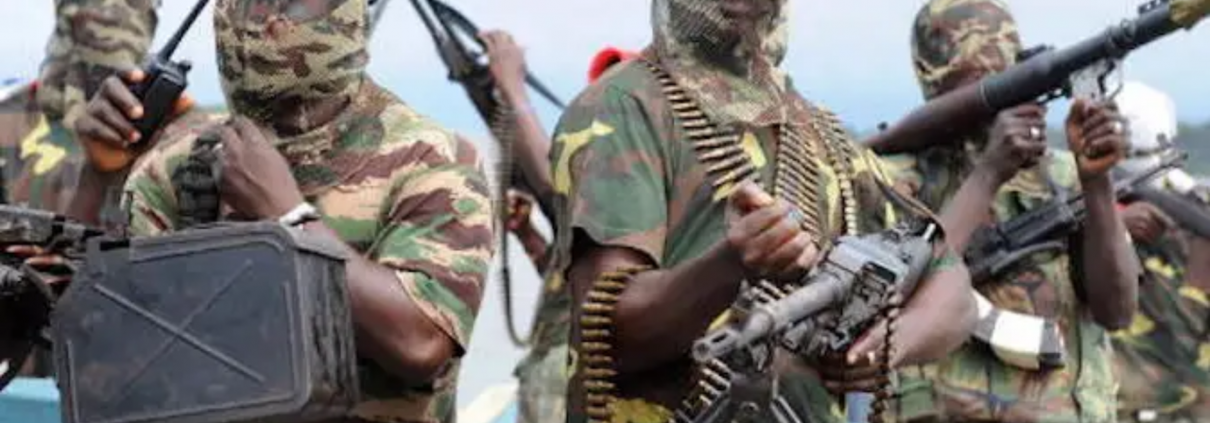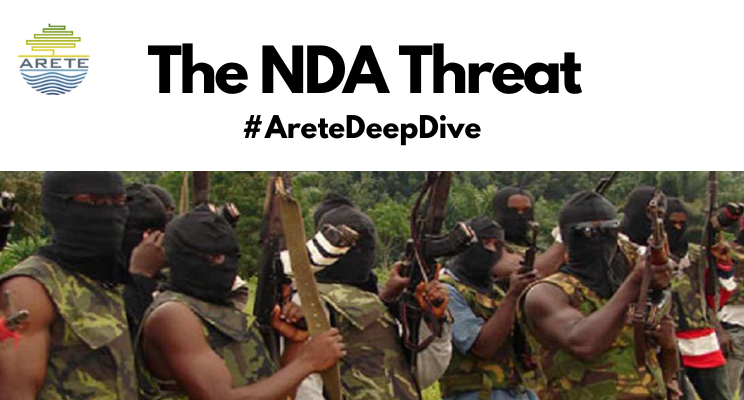#AreteDeepDive – The NDA Threat
On the 26th June 2021, the Niger Delta Avengers militant group announced the launching of “Operation Humble”. The threat message stated that the group would once again bomb oil installations in the Niger Delta region with the aim of crippling the Nigerian economy. It also threatened to attack politicians who are working with the Federal Government “…to undermine the Niger Delta region.” The threat statement was intended to focus attention on the ongoing discussion concerning the new oil bill and the issues of derivation funding, strategic development, and investment, and calls for social justice for indigenes of the region.
In this #AreteDeepDive, we take a look at the threat and what it means for all stakeholders in the region.
So what is the basis of this latest threat, and is it credible?
The Niger Delta Avengers emerged in 2016 when, on 13 February, the Forcados export line was bombed in a sophisticated underwater attack. The NDA claimed responsibility and announced that they “will continue blowing up pipelines until the Niger Delta people were no longer marginalized”.
The group went on to strike repeatedly throughout 2016, targeting specific, strategic nodes and links in the pipeline networks in the region which consequently halving Nigeria’s oil export capacity. The impact was to force the country into a recession as oil revenues plummeted. Their last confirmed attack occurred in November 2016, after which the attacks ceased when the Pan Niger Delta Forum brokered a ceasefire. Since then, the group has been active only sporadically and has focussed on political agitation.
Their stated aims are the establishment of the Niger Delta Republic and social and distributive justice for its people. The group has consistently remained critical of the incumbent President and has been supportive of the Biafran separatist Nnamdi Kanu, leader of IPOB.
It is noteworthy that throughout 2016 the NDA issued several threats which they then subsequently carried as promised. This is at odds with the usual rhetoric that fills the media from the many other militant groups active in the region (noting the region has seen as many as 36 active militant groups at any one time).
As a group noted for carrying out its threats the NDA developed a reputation as one of the most dangerous and active groups ever to emerge in the region, however since 2016 its capability has appeared to diminish. For example, in 2019 the group threatened to cripple the country’s oil industry if President Buhari was re-elected for a second term yet this threat failed to materialise.
What is different this time around?
There are a number of factors that make this latest threat from the NDA worthy of attention.
The content of the threat focuses on a loss of confidence in the peace processes and the development programs for the region. It names the Pan Niger Delta Forum (PANDEF) as a failure and in doing so decouples itself from the pre-eminent Ijaw leadership of Chief Edwin Clark. It is noteworthy that it has previously denounced PANDEF in 2017 when the group said it had withdrawn from a ceasefire agreement.
Nigeria’s economy is currently in a parlous state, with rising debt, rampant unemployment, and dangerously low revenues and investment. While many commentators point towards a slight recovery in 2021, the indicators are that the economy will continue to suffer throughout the year. The knock-on effect of this is continued poverty and hardship in some areas of the Niger Delta meaning the continuance of fertile recruitment grounds for criminals and extremist groups.



